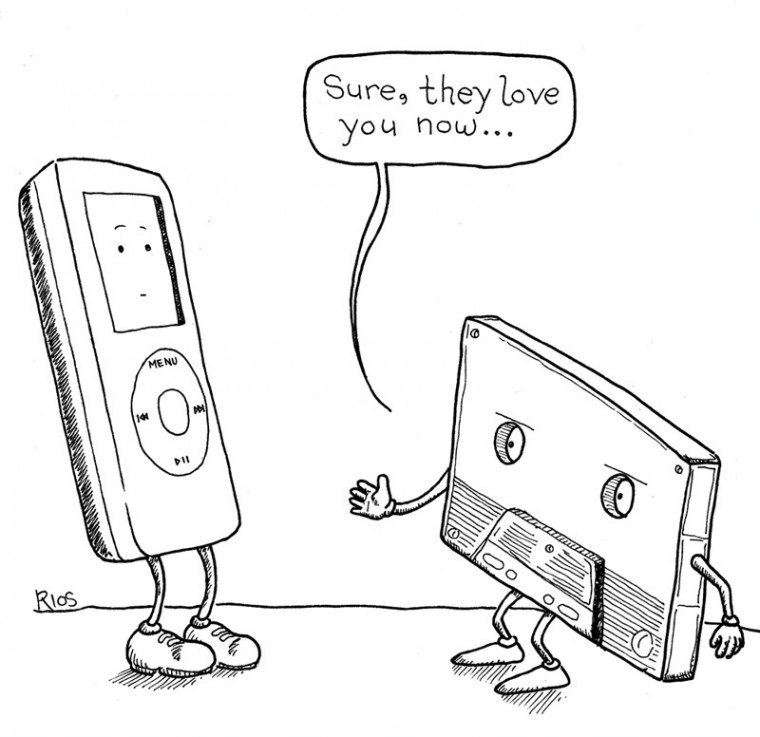No replacement for music albums
December 1, 2007
Earlier this semester, I bought my first MP3 album. It was an unsatisfying experience.
Don’t get me wrong, the process itself was pleasant. Within minutes of finding an album by the obscure Welsh post-punk band Datblygu, I owned the thing. Cheap, fast, secure. It was kind of awesome.
But something was missing. At first, I thought it was just the shrink wrap. Eventually, I came to a different conclusion. Up until that point, I hadn’t realized how satisfying buying music could be. Call it a symptom of late-stage consumerism, whatever. But it seemed like buying an MP3 turned music shopping into a lifeless process.
Subconsciously, I’ve known this. That’s probably why it took so long for me to toss my hard-earned dollars into the iTunes coffers. MP3s are just too disposable and fleeting. In a lot of ways, they turn our favorite music into superficial, ambient sound. A constant soundtrack to our lives, sure, but it comes at the expense of conscious intake of said soundtrack. Granted, pop music has often been contrary to introspection and intellectualization. But MP3s make it even easier to toss music aside.
Still, downloads are obviously becoming the preferred form of distribution by both the public and industry. Even if it took me a while to pay for a download, I’ve still got a hard drive filled with MP3s. And really, as much as I might resist, in at least a few ways it’s a good thing.
The whole convenience factor is the most obvious benefit. I can stick a sixth of my digital music collection in my pocket when I leave home. That’s pretty sweet. Walk around campus and sport the headphones. It would seem most people concur with stated sweetness. An MP3 is also at least a little more environmentally friendly. Once again, I’m reminded of that shrink wrap. But the whole process of pressing and distributing a release is pretty waste intensive.
The greatest benefit of downloading music, however, is its potential to reshape the music industry. Since the beginnings of recorded music, record labels have acted as intermediary between musician and audience. As British rockers Radiohead have shown though, it need not be that way.
The band removed the middleman from the equation when it put its new album “In Rainbows” on its website for download this past October. Radiohead gave folks two options: download the album at a modest bit-rate (for free or with an optional donation) or pay for a lavish vinyl boxset priced at roughly $80.
It’s still too early to call the project a success or failure. While the album has been received warmly by fans and critics, the real numbers on who paid how much for what have not been released. A Web analyst firm called comScore reported that only 40 percent of the people who downloaded the album chose to pay for it. The average payment according to comScore was $6. But, as band representatives pointed out, comScore’s numbers are based on speculative web tracking.
“As the album could only be downloaded from the band’s website, it is impossible for outside organizations to have accurate figures on sales,” representatives said.
If that 40 percent of the couple million people who downloaded the album only paid $6 a pop, that’s still a lot of money. Since the band and associates did the legwork, there’s no middleman to siphon some off the top. And if that wasn’t enough, the band will release a CD version of the album next year.
Of course, Radiohead is an exceptional case. Most artists don’t have the resources or exposure of a band like Radiohead. The real test will come when we hear results from other online distribution experiments, like the release of underground rapper Saul Williams’ “The Inevitable Rise and Liberation of NiggyTardust!” While some might be drawn to the album thanks to the involvement of Nine Inch Nails frontman Trent Reznor, it’s still a Saul Williams album. And last time I checked, a Saul Williams release doesn’t tend to capture the ears of the masses.
Anyway, in spite of all the neat things an MP3 revolution implies, I still have an illogical attachment to bulky media. I still want to rummage through dollar record bins and make mixtapes that are actually recorded on tape. But I guess I’ll embrace digital music all the same. Even if it feels so? I don’t know.
Empty.
Paul Rios can be reached at [email protected].





























































































































